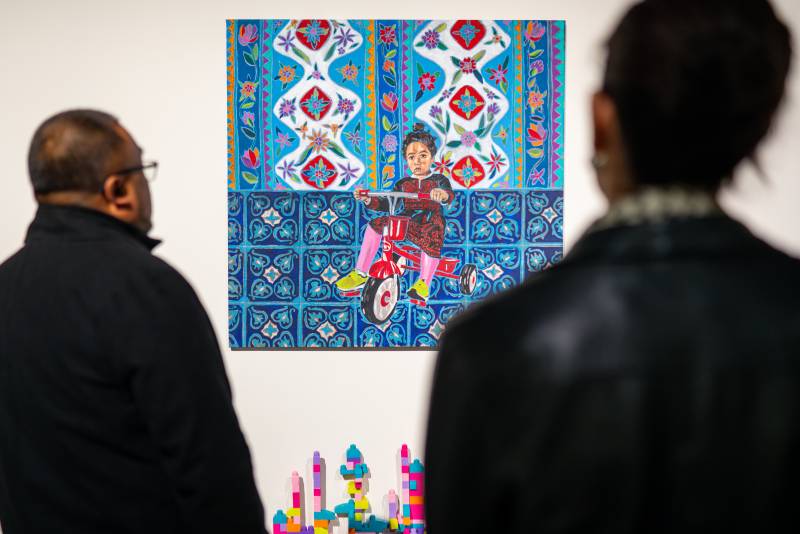When I arrive at SOMArts just hours before the opening of its new show, From the River to the Bay, curator and artist Chris Gazaleh is painting the words of Gazan poet Refaat Alareer on the wall.
“If I die / you must live / to tell my story,” he writes in Arabic script in the colors of the Palestinian flag. The text of the poem frames pencil drawings by Gazaleh that feature solemn faces with pleading eyes. They’re surrounded by symbols of everyday Palestinian life — traditional tatreez embroidery, an oud, poppies and oranges — that telegraph Gazaleh’s vision of a vibrant past, and future, outside the Israeli occupation.
The stylized illustrations might be familiar to anyone who’s exited the Central Freeway at Market and Octavia and seen Gazaleh’s 3,000-square-foot mural of a woman looking over a crumbling West Bank wall. In it, she holds a key, symbolizing refugees’ right to return. It’s one of the many pieces of public art Gazaleh has painted in San Francisco over the past 20-plus years.
Gazaleh, whose grandparents are from Ramallah, has dedicated his art practice to uplifting the Palestinian struggle, despite risking alienation from mainstream art institutions, and having his murals repeatedly defaced. Though his work has sometimes caused controversy, SOMArts gave him and the ten other featured artists a blank canvas to express their views. SOMArts’ approach is a rarity in the art world; locally and nationally, museums have accompanied pro-Palestinian work with disclaimers or just not shown it at all.

In From the River to the Bay, his first exhibition as a curator, Gazaleh’s work hangs among a cohort of like-minded artists in a show of solidarity with the people of Gaza and the West Bank. The show arrives at a precarious time as Israel and Hamas negotiate the second phase of their ceasefire deal. On Tuesday, President Trump suggested that the U.S. should take over Gaza, displace its two million Palestinian residents and turn the territory into a “Riviera of the Middle East” — a move that political observers and human-rights advocates say amounts to a call for “ethnic cleansing.”



